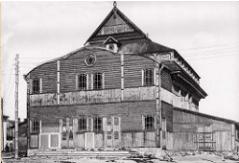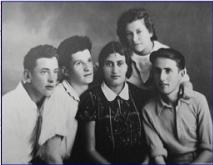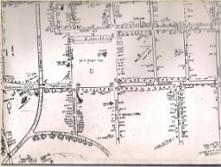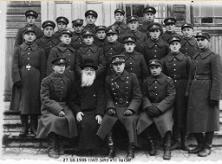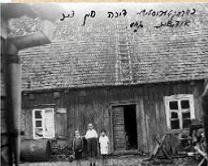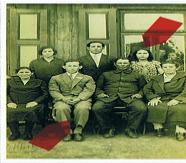I had been studying in Czechoslovakia from 1933 till 1933. I had reached the age of 21 and had to do my military service. I saw notices that young people who were now eligible to do their army service are requested to sign up for pilots' course. I went home and told my parents "I am going to be a pilot" they told me that I should do what ever I want. I went to the local commandant, I was greeted their by Captain Tominas Tominshantus. I told him that I wished to join the pilots course - he seemed a little surprised and even a little dazed and left for the other room - and then returned and stuttering told me that Jews cannot be accepted for this course.
I was so angry and boiled inside - but showed nothing to the officer. ÒWell this is very nice, so if you don't want me for the army please write me a note that you are discharging me from any need to do military service and I will go and learn.Ó The officer replied that although I would not be accepted into the pilots' course I still needed to do my military service. Without any further ado I returned home. On the way I met Goshtav Tas. Goshtav Tas was Colonel in the Lithuanian Reserves Army and both Mayor of Vilkaviskis and the surrounding district. He knew me and knew that I had been overseas - when we met he said "Shalom Shalom.. How are you? How was life in Czechoslovakia?" In return I said "How can you compare Lithuania with Czechoslovakia - Czechoslovakia is a democratic country I saw Masarik with my own eyes - he was walking down the street with people clapping their hands. How can you compare racist Lithuania with Czechoslovakia?"
He replied "Don't take it to heart - you see here based close to Vilkaviskis is the 9th Regiment here there are Jews in the regiment - one is a barber, one is a shoemaker, one shows films and another works in his shop - fighters none of them are. I want to ask you a question do you want to be a pilot do you want to be an officer? If so come to my office.
I went to his office filled out a form and they accepted me.
Now when the Russians entered Vilkaviskis, I saw him remove his Lithuanian uniform and take part in the celebrations! However, none of this helped him as he was sent to Siberia with me. I asked him "How could you do this after all you were an officer in the Lithuanian army?" He replied in Lithuanian: "When they are playing a waltz you cannot dance a tango"
I have passed over a lot of things but after I completed my army service I continued my studies. By 1939 I was very active in the organization of illegal immigration to Palestine - I was sent to Vienna, which had already been occupied by the Nazis. I was involved with in negotiations with the Nazis to send Jews via Bratislava to Palestine. After completing our negotiations I was about to return my taxi to Czechoslovakia when I was beckoned by a group of Jews. They explained to me that they knew I was leaving Vienna for Prague and they had in the possession a large amount of gold, jewelry and foreign currency. They requested that I take this with me and if they were able to leave Austria in the future they would redeem it - if not all the property would remain mine.
Although when we entered Austria we were barely checked I had to explain that as I was on official business I could not take the risk of involving myself in any illegal activities. When we arrived at the Czech-Austrian border - the scene was "black" with S.S. officers. They, of course stopped us and I had to get out of the taxi - I was strip-searched and the S.S. officer said: "If we find any contraband you will be shot on the spot." Then they stripped the car - taking off the wheels and taking everything possible apart. They of course found nothing and finally gave us permission to cross the border into Czechoslovakia. This was at the end of February 1939 at the border checkpoint they said by the 15th of March we will be in Prague!
On returning to Prague everyone was waiting for me - I told them what I had heard at the border checkpoint - that by the 15th of March the Germans would enter Prague. My friends said "So what!" Exactly on the 15th of March the Germans entered Prague and I saw Hitler from the distance that I can see you.
My wife and I decided to leave Czechoslovakia - we went to but tickets to return to Lithuania - at the station we were told that without permission from the Gestapo we could not obtain the tickets - we had to wait a week for the meeting with three members of the Gestapo - they asked us if we are Aryans and I replied "No we are Jewish" and with that we received permission to leave and we returned to Lithuania.
Within a month or so I was called up to the Lithuanian army - I received a "pluga." This was in 1939 - it was just before a Jewish holiday, the "mefaket ha guded" called me and said "Today is a Jewish holiday - every Sunday we release the Catholic soldiers so that they can go to church - take the Jewish soldiers so that they can go and pray in the synagogue." I collected all the Jewish soldiers and we marched my soldiers to the synagogue - here we were greeted and given everything that we needed to pray with. At the end of the service we returned to camp.
This was in 1939 and on the first of September, Germany invaded Poland. Two weeks passed and there came to me two Jews [Starkovsky and Kaminsky ] as I was in uniform of an officer, and told me: "On the border between Poland and Lithuania are a group of Jews who have been expelled from Suwalki and Wignay and you need to save them." I asked them "and what do you suggest ?" "You are an officer and you have a car."
We set off for the border. When we arrived at the border checkpoint, they remained in the car and I asked to see the officer in charge - he arrived, saluted me and I asked him what was the situation? He told me " I don't understand. In Vilna there are so many Polish refugees but I am refused permission to let these Jews in and the Germans don't allow them to return to their homes.
I said to the officer - come and join me at a restaurant that I know well - in Kabaki (?) called ÒWochanskyÓ it was very well known. At the restaurant we ate and decided that we return to the border post with excellent lunches, beer and spirits - then he would give his soldiers a few hours to relax and eat the food, at the same time I organized some trucks and we took the Jews from no mans land and brought them to Vilkaviskis. Now everyone in Vilkaviskis was involved, first of all they went to the public baths, then they were given clothes and then distributed to the families. The local police and the Mayor never said a word, the whole operation succeeded without a word.
When the Russians took over the country and introduced the Stalinist laws - who were the local communists? The Jews ! Especially the young Jews. I learnt this in 1956. When I returned from Siberia. They informed on the Mayor, beat and humiliated him - he was arrested and imprisoned in the prison in Mariampole until the Germans arrived. When the Germans arrived he was released and appointed as the Mayor of Mariampole. He was the man in charge of killing the Jews of Mariampole !
This was the man who enabled me to become an officer in the Lithuanian Army. How can you understand this?
In 1956 after many years in Siberia - I studied accounting and received a Diploma for my studies, I was able to receive a Òvery good.Ó After the death of Stalin I was rehabilitated - how did this come about?
When I returned to Lithuania in 1957 I discovered that the State Prosecutor had been my neighbor - he had been a close friend of my brother. I went to see him although he received me very coolly. He said that I had been accused of being the owner of a great deal of capital. I told him that he knew that this was not the case as in 1939 I just returned from my studies overseas. He then told me that when I was arrested by the NKVD the workers at the bristle factory requested that I be released.
I would like to say that when the German's entered Poland they did not begin with the slaughter of Jews - but when they entered Lithuania [and it was Russian control] then began the slaughter.
From the age of 13 I was an active member of the Betar organization - from the age of 15 I was still in the Gymnasium in Vilkaviskis - in 1929 Uri Zvi Greenberg came to Lithuania - this was after the Pogrom in Hebron - the notices said in Yiddish "Eretz Israel in Flames!" The head of our Gymnasium invited him to give a lecture an academic lecture - the headmaster invited him onto the stage and said "In our school we only speak about poetry, not on politics! [The family Rosenholz had sent their son to Hebron and he was killed there]. He looked at the head and said "Excuse me headmaster - I will be failing our nation if I do not tell what is happening in Palestine."
Then he addressed us and said: "Its your job to go to Palestine build the country and we will overcome all of these problems."
In 1933 visited Warsaw and at the same time the Nazis came to power in Germany - he wrote this poem in Yiddish and this poem has been with me all of my life.
"From every direction arrows
Tens of millions are blood thirsty
And we do not have swords from metal
Just our bodies against the arrows
From every direction gas
And we do not have masks to protect ourselves,
Only our clear faces and our open doors,
If the Aryans have in their minds thoughts?
If the British were dreaming like us of a homeland with an outlet to the sea ?
The British would be retching their hearts out instead of singing "God save the King"
They would be ????????????????????????
For us to overcome the gas demands us to survive and in time will heal the wounds.
With wonderful colors we will settle both sides of the Jordan
I showed Mr. Pustapetzki the picture of the Lithuanian Jewish soldiers - with Rabbi Grin sitting in the forefront. He spoke of the tragic death of Rabbi Grin - of how he fled to Pilvaskai [ my mother and her family where also there] and there he hid amongst the women and children [the men had already been killed ]; he was caught by the Germans and buried alive.
ÒI remember one incident - as I said before I had a small car, a Hillman, that I received as a wedding present. I had been driving the car whilst I was in the army and Rabbi Grin called me to see him one day - he requested that if I had to drive on Saturdays I would do it less "publicly." After our meeting I made every attempt not to be seen and I would drive around the town rather than going through it to comply with the Rabbi's request.
ÒI can't say that I am a religious man - but I believe in giving honor to our religion. I remember when I was in Siberia - there we were starving, they brought Yeshiva students from Poland - they had been their for around six months and they were in a very miserable condition but when Yom Kippur arrived their Rabbi ordered them to eat as "Pikuah Nefesh" but not one of them ate. All the gentiles were amazed at their beliefs and within two weeks came an order and they were freed to join General Anders army in Tehran.
Leiser Lapidus - he visited me several years ago. He must be around 90 and lives today in Canada. They had a store for leather goods and shoes - he took all the contents of his shop and traveled to one of the villages. He gave the goods to the inhabitants and they hid him throughout the war.
To describe the relations between the Lithuanians and the Jews is a very complicated subject - after all, when the Germans invaded Poland the Poles did not take an active part in killing the Jews - whilst in Lithuanian they did. When I returned to Vilkaviskis I met a man called Bulagas, he was so happy to see me, he put out his hand to greet me "Oh, Mr. Pustapetzki how good it is to see you." Rudshtein said to me: "Don't touch him he shot us well." Bulagas said: "No I didn't shoot I just rounded up the Jews." He didn't shoot which made him very righteous.After all before the war he had been the town's dog-catcher.
It hurt me very much that after Lithuania became independent in 1992 they enacted laws that disenfranchised the Jews from either receiving compensation or for receiving their Lithuanian nationality:the Lithuanians both murdered and then received the inheritance of the former Lithuanian Jews.
The matter is certainly very complex - just before the German invasion I was deported by the Russians to Siberia. When I was arrested all of my family and some of the Jewish residents of Suwalki that we had rescued begged that I be released. In the wagon were myself and another Jewish man and about 90 Lithuanians. Amongst the Lithuanians was a pilot, Bargonis, I knew him. He began to speak with his girlfriend: "when we return we will slaughter all the Jews." I had had enough and gave him a good blow and then he began to shout: "No no Mr. Pustapetzki you we won't touch."
It was my "luck" to be sent to one of the Gulags in Siberia - there conditions there were awful - one of my close friends died there from exhaustion. When we came to bury his body there were signs of cannibalism.
After my release I met Bargonis in Vilna and he seemed so happy to see me. He came to hug me: "It was fortunate that they sent me to Siberia - otherwise I fear I may have murdered the Jews." Now I have married and have a family. Who did he marry? the nurse who had entered our wagon on the way to Siberia. It was this nurse who had told the Lithuanians that within a few days the Germans will be here - and they will release you. The Lithuanians were full of joy. After about two hours the door of the wagon again opened and my name was called. Standing there is my mother and next to her Aluf Mishna Zimbal. When the Russians occupied Vilkaviskis this officer was billeted in our house, whilst we were forced to leave. However I had stayed on good terms with him as I spoke Russian. My mother had gone to him for his help in getting my release.
The first thing I said to my mother was: "They say that within a few days the Germans will be here!" I beg you take the whole family [at that time they had been living in Pilvaskai] and follow me to where ever they take me." But unfortunately she did not believe me. I guess she did not believe me - but Pulcovnik did believe and he prepared a truck, and when the war started he [he was the brother of Gila Teitelbaum].
I had been successful in my studies at school and then received to go to university. My mother wanted me to be a doctor and in 1932 I went to Kovno. I had to be examined in Lithuanian as I had studied at the Gymnasium Ha Ivri. Unfortunately I arrived a day late - and thus was in danger of losing a whole year's studies. Students from our town suggested that I go to the Prorector and request that he examines you. I found him, he was a priest - he wrote my name Shmarihu Pustapetski [do you know where the name comes from ? yes there is a small village called Pustapetski very close to Vilkaviskis and our family had lived there for generations] He asked me what is the meaning of the name Shmarihu - I told him: Óthat God will look after him." He said: "That's fine you have no need for further examinationsÓ and I was accepted. I studied Biology for one year until we had to begin to dissect corpses, that was enough for me and I left university and began working for "Hacksara" here I worked in agriculture.
A little more about the time I spent in Siberia. They took us to ???????????????.. a miserable place in the middle of Siberia - a slave market in the USA was heaven compared with this place. They checked who was strong enough, I told them that I had experience of working with accounts. They told that I would work for a company called?????????????.. , I saw that this company was in a very bad situation and that they didn't have enough money to pay salaries. Then I was called back - there came Pashkov, he was a commissar, and he was in charge of shops . He told me that I would be in charge of all the fur purchases. I told him "No thank you."
"Oh, anyone else would jump at the possibility!" I told him that I could not do a job that I knew nothing about. I think he appreciated my honesty and he told the officials that he would take me and I employed as his chief accounts clerk. I was able to stand up for myself - and as you see the results were good - this happened to me a lot during my life.
I showed Mr. Pustapetski some old pictures of the Vilkaviskis
"Ah close to our house was an open area of ground" [then I showed him pictures of our visit to Vilkaviskis - I explained that Wayne was related to the Sperling family. "I was in a class with a Sperling girl for one year."
I should Mr. Pustapetski detailed pictures of the cemetery and here he found the grave of his grandfather - I think he was very moved. He told me that his sonhas traveled several times to Vilkaviskis but has never been able to find the grave.
He also told that his son was born in Siberia. After he had completed his sentence, a KGB officer approached him and ask him if he would like his family to join him. "I never believed that they would accept my request but they did and a few years ago my son discovered my file and the description that I was a very dangerous criminal." Anyway, I was sent into exile with his wife and there my son was born.
In 1952 my son was born, and in 1953 Stalin died, I was at work and around me everyone was crying, I went home and after I was sure that no one could hear us I told my wife "Stalin is dead - lets dance the Hora!"
I told you that I was involved in the Betar movement - I wanted to make Aliyah. That was before I went to Czechoslovakia in 1933 - I went to "hacksaara" and I wanted to make Aliyah to Eretz Israel.
I sent on a course madrikeem and then I went to guide and teach at all the branches of Betar in Lithuania. After I finished my Lithuanian army service I was requested to take up the position of officer in charge of "alternative emigration" for Betar. Then when I went to Czechoslovakia I was very involved in illegal emigration. We organized trains to Constanza and from there to Palestine by boat.
You see that in this street [need to find out which street] was a factory for producing soft drinks - one day the factory caught fire and the sounds of the gas bottles exploding was just like in the war.
There was a retarded man who ran out into the street shouting: "Oh what luck - my mother died last week - if she had still been alive she would have been so frightened by all this noise!.
